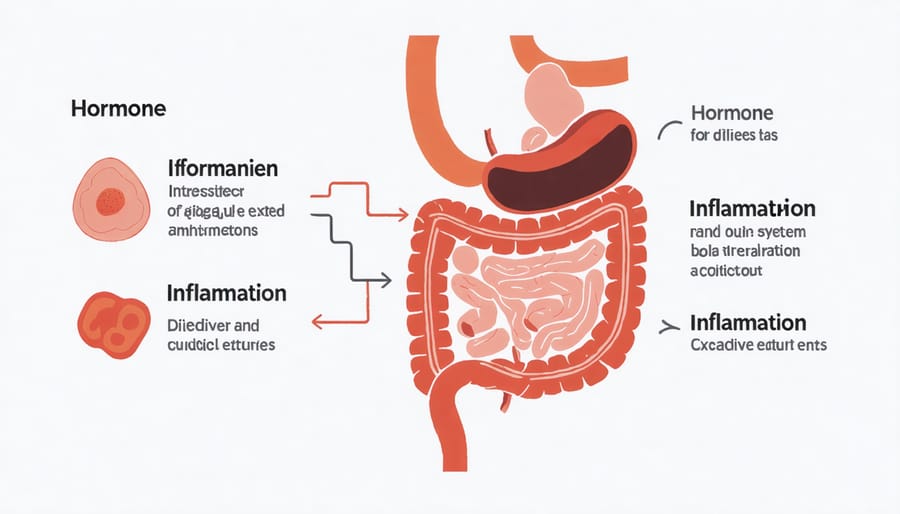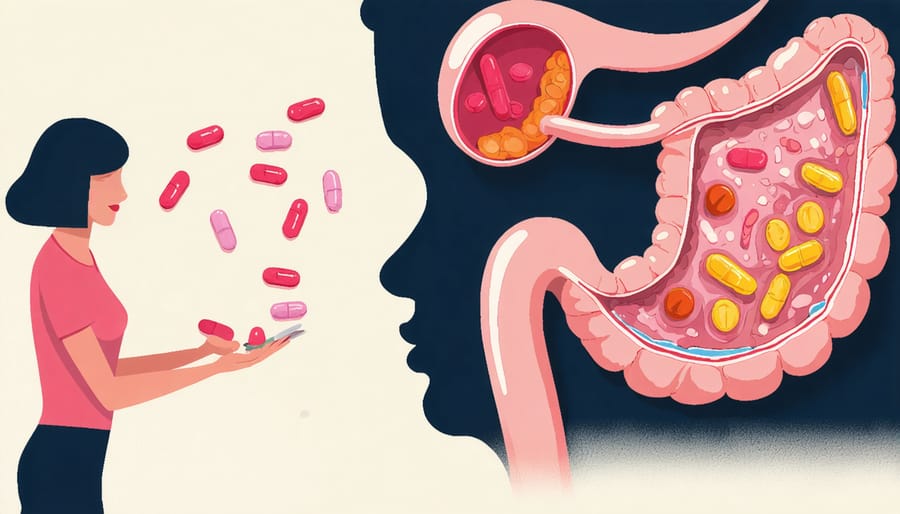Managing birth control while living with Crohn’s disease requires careful consideration and personalized medical guidance. The relationship between inflammatory bowel disease (IBD) and reproductive health presents unique challenges that impact both condition management and contraceptive choices. Research shows that certain birth control methods may work differently for people with Crohn’s disease, particularly during flare-ups when medication absorption can be affected. Additionally, some Crohn’s medications can interact with hormonal contraceptives, making it essential to develop a coordinated approach with your healthcare team.
For women with Crohn’s disease, choosing the right birth control method isn’t just about preventing pregnancy—it’s about finding an option that works harmoniously with their IBD management plan. Modern contraceptive options offer various solutions, from hormone-free alternatives to long-acting methods that bypass digestive absorption concerns. Understanding these choices and their potential impact on Crohn’s symptoms empowers patients to make informed decisions about their reproductive health while maintaining effective disease management.
How Crohn’s Disease Affects Hormonal Health
The Inflammation-Hormone Connection
Your body’s inflammatory response and hormone levels are closely interconnected, creating a complex relationship that affects both Crohn’s disease and hormonal health. When inflammation occurs in your digestive system, it can disrupt the normal production and regulation of hormones. This disruption can affect everything from your menstrual cycle to how well your birth control works.
Think of it like a two-way street: inflammation can throw your hormones off balance, while hormonal changes can influence inflammation levels in your body. During a Crohn’s flare-up, increased inflammation can interfere with how your body processes hormones, potentially affecting the effectiveness of hormonal birth control methods.
Understanding this connection is crucial for managing both conditions effectively. By working with your healthcare team to control inflammation, you can help maintain more stable hormone levels and potentially improve how well your birth control works.

Common Hormonal Challenges in Crohn’s
Living with Crohn’s disease can affect your body’s hormonal balance in several ways. Many patients experience irregular menstrual cycles, which can make family planning more challenging. Inflammation from Crohn’s can interfere with how your body produces and processes hormones, potentially leading to mood changes and fatigue.
During disease flares, you might notice more severe premenstrual symptoms or changes in your typical cycle length. The stress of managing Crohn’s can also impact your hormonal health, as stress hormones like cortisol can affect your reproductive system.
Malnutrition, which is common in Crohn’s disease, can disrupt hormone production and regulation. This is because your body needs specific nutrients to maintain healthy hormone levels. Some patients also experience delayed puberty or irregular periods due to inflammation and nutritional challenges.
Understanding these hormonal changes is crucial when choosing birth control methods, as some options might work better than others depending on your specific symptoms and disease activity.

Birth Control Options for Crohn’s Patients
Oral Contraceptives and Absorption Concerns
For people with Crohn’s disease, the effectiveness of oral contraceptives can be a concern due to how the condition affects nutrient absorption in the digestive system. When Crohn’s affects the small intestine, it may reduce the body’s ability to properly absorb birth control pills, potentially making them less reliable for pregnancy prevention.
Several factors can impact pill absorption, including active disease flares, diarrhea, and vomiting. If you experience these symptoms for more than 24 hours, the contraceptive effect might be reduced. This is particularly important to consider if you’ve had surgery that removed portions of your small intestine, as this can further affect medication absorption.
To ensure effective birth control, many healthcare providers recommend additional contraceptive methods during active disease periods. This might include using barrier methods like condoms as backup protection. Some patients may benefit from switching to non-oral forms of birth control that bypass the digestive system entirely, such as injectable contraceptives, implants, or intrauterine devices (IUDs).
It’s essential to work closely with both your gastroenterologist and family planning provider to develop a birth control strategy that accounts for your specific situation. They can help monitor the effectiveness of your contraception and make adjustments as needed based on your disease activity and overall health status.
Alternative Methods Worth Considering
For those managing Crohn’s disease, several birth control methods that bypass the digestive system offer reliable alternatives to oral contraceptives. These options can be particularly beneficial if you experience frequent flare-ups or absorption issues.
Hormonal IUDs (intrauterine devices) are a popular choice, as they work locally in the uterus and aren’t affected by digestive symptoms. They provide long-term protection for 3-7 years, depending on the type, and many users report lighter periods, which can be helpful during flare-ups.
The birth control patch delivers hormones through your skin, avoiding the digestive tract entirely. You’ll need to change it weekly, and it can be a good option if you’re comfortable with a regular maintenance schedule.
Another effective option is the birth control injection (Depo-Provera), administered every three months. Since it’s delivered directly into muscle tissue, it bypasses digestive concerns completely.
The vaginal ring is another digestive-friendly choice, releasing hormones directly through the vaginal wall. You’ll need to replace it monthly, but it offers consistent protection without relying on daily absorption through your digestive system.
Remember to discuss these alternatives with your healthcare team, as they can help determine which method best suits your specific situation, considering both your Crohn’s symptoms and overall health needs.
Making Informed Decisions About Birth Control
Questions to Ask Your Healthcare Team
When discussing birth control options with your healthcare team, being prepared with questions can help you make informed decisions. Here’s what to ask:
About Your Crohn’s Disease:
– How active is my Crohn’s disease currently?
– Could my Crohn’s symptoms affect how well different birth control methods work?
– Should I adjust my birth control during a flare-up?
About Birth Control Options:
– Which birth control methods are safest with my current medications?
– Are there any forms of birth control I should avoid?
– Could hormone-based birth control affect my Crohn’s symptoms?
– What should I do if I have trouble absorbing oral medications?
About Managing Both:
– How often should we review my birth control choice?
– What symptoms or changes should I report to you?
– What’s your preferred way to reach you if I have concerns?
– Should I involve my gastroenterologist in this decision?
About Emergency Situations:
– What should I do if I miss a dose during a flare-up?
– When should I seek immediate medical attention?
– Do you recommend keeping emergency contraception on hand?
Remember to take notes during your appointment and don’t hesitate to ask for clarification if something isn’t clear.

Monitoring Your Body’s Response
When using birth control while managing Crohn’s disease, it’s essential to keep track of how your body responds. Start a daily health journal to record any changes in your Crohn’s symptoms, particularly during different phases of your menstrual cycle. Note any unusual bleeding, cramping, or digestive issues that seem different from your typical Crohn’s symptoms.
Pay special attention to signs that might indicate your birth control method isn’t working as effectively as it should, such as breakthrough bleeding or increased Crohn’s flare-ups. During active flares, be especially vigilant about tracking when you take your birth control and any episodes of vomiting or diarrhea that might affect medication absorption.
Consider using a mobile app or simple calendar to track both your birth control schedule and Crohn’s symptoms. Share these observations with your healthcare team during check-ups – this information helps them adjust your treatment plan if needed. Remember that what works for others might not work for you, so monitoring your individual response is crucial for finding the right balance between managing both conditions effectively.
Lifestyle Considerations and Support
Nutritional Considerations
When managing both Crohn’s disease and birth control, understanding how diet affects hormone balance is crucial. Focus on eating nutrient-rich foods that support both digestive health and hormonal function. Include foods high in B vitamins, such as leafy greens and lean proteins, which can help offset any nutrient deficiencies common in Crohn’s disease and support hormone regulation.
Anti-inflammatory foods like salmon, walnuts, and olive oil can help manage Crohn’s symptoms while providing essential fatty acids that support hormone production. Ensure adequate calcium intake through dairy alternatives if you’re lactose intolerant, as both Crohn’s and some birth control methods can affect bone health.
Stay hydrated and maintain a consistent eating schedule to help your body absorb medications effectively. Consider working with a registered dietitian who can help create a personalized meal plan that accounts for your specific triggers and nutritional needs. They can also recommend supplements if needed, ensuring they won’t interfere with your medications or trigger flare-ups.
Remember to keep a food diary to track how different foods affect both your Crohn’s symptoms and your response to birth control. This can help you identify patterns and make informed choices about your diet.
Building Your Support System
Living with both Crohn’s disease and managing birth control can feel overwhelming, but you don’t have to navigate it alone. Alberta offers numerous resources and support systems to help you make informed decisions about your health. The Alberta Crohn’s and Colitis Foundation provides educational workshops and support groups across major cities, including Edmonton and Calgary.
Connect with healthcare professionals who specialize in gut health and IBD management through the Alberta Health Services’ Inflammatory Bowel Disease Clinics. These clinics often have dedicated reproductive health specialists who understand the unique challenges of managing both conditions.
Local pharmacists can be valuable allies in your healthcare journey, offering medication consultations and helping you understand potential interactions between your Crohn’s medications and birth control options. The Women’s Health Resources at Alberta Health Services also provides confidential counseling and family planning services.
Consider joining online communities specific to Alberta, where you can connect with others who understand your experience. The Alberta Health Link (811) is available 24/7 for health advice and information about local support services.
Managing both birth control and Crohn’s disease requires careful consideration and open communication with your healthcare team. Remember that every person’s experience with Crohn’s disease is unique, and what works for one may not work for another. The key is finding the right birth control method that aligns with your specific needs while effectively managing your Crohn’s symptoms.
Don’t hesitate to discuss your concerns and preferences with your healthcare provider. They can help you develop a personalized plan that takes into account your disease activity, lifestyle, and family planning goals. Regular check-ups and open dialogue about any changes in your symptoms or concerns are essential for maintaining optimal health.
By staying informed and proactive about your healthcare choices, you can make confident decisions about both your reproductive health and Crohn’s disease management. Remember, you’re not alone in this journey – there are healthcare professionals and support resources available right here in Alberta to help guide you every step of the way.

